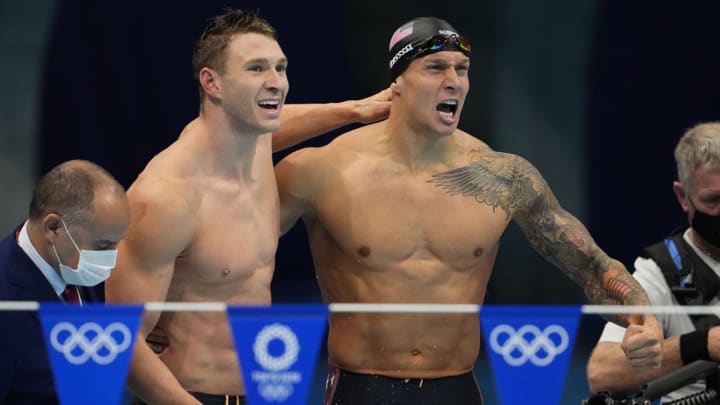USA Swimming Announces Bonus Plan Up to $1 Million as Incentive for Relay Events

USA Swimming is implementing an ambitious bonus plan that could pay up to $1 million at the Paris Olympics for a gold-medal relay sweep, national team managing director Lindsay Mintenko tells Sports Illustrated.
The bonus structure will go into effect this year for the FINA World Championships in Fukuoka, Japan. USA Swimming will award $500,000 if the U.S. wins all seven relays at that meet, or a $150,000 payout if the nation makes the medals podium in all seven. Next year in Paris, the bonuses would jump to $1 million for sweeping all seven relays, or $250,000 for earning medals in all relay events.
The bonus pool would be split equally among all USA Swimming team members for those competitions, including open-water swimmers. That’s roughly 50 athletes on both the World Championships and Olympic teams.
The seven relays in international competition are men’s and women’s 400-meter and 800-meter freestyles; men’s and women’s 400-meter medleys; and a 400-meter mixed medley (two men and two women). Olympic qualifying for the relays will take the top three times in each event from the World Championships this summer, plus the next 13 best times from a combination of that meet and the 2024 World Championships in Doha, Qatar, next February.

The motivation for the bonuses? To maintain the U.S.’s position as the preeminent relay nation in an increasingly competitive global setting. This will provide some incentive for the best U.S. swimmers to keep relay events prominent in their plans—particularly the 100 and 200 freestyles—as they schedule their events at qualifying meets for major international competitions.
“A lot of people look at swimming as an individual sport, but there’s a team component, and the relays are at the center of that,” Mintenko says. “We were trying to brainstorm ideas that would help bring that sense of pride. This shows how important those relays are for Team USA, for our culture. I think doing well in relays spurs everyone to do better.”
USA Swimming rolled out the plan for its national team members Monday. Backstroker Ryan Murphy, the leadoff man on gold-medal Olympic medley relays in both 2016 and ’21, says the money isn’t as important as the overall emphasis on U.S. excellence in relay events.
“Every year, one of our first team goals is to be great in the relays,” Murphy says. “It’s a great way to rally the team. I’m not thinking about the financial incentive, to be honest. We want to win relays no matter what, but now it’s ingraining that goal in our thinking every year.”
The U.S. relay results at the Tokyo Olympics in 2021 were strong, winning five medals, but would not have earned any bonus money under the current structure. The U.S. men won gold in the 400-meter freestyle and medley (the latter in world-record time) but missed the podium in the 800 free. The women earned silver medals in the 800 free and medley, and bronze in the 400 free. The mixed-medley relay also missed the podium.
Last summer at the World Championships in Hungary, the U.S. won five out of seven golds, with two silver. That would have been worth $150,000 under the current bonus structure, but there was one result that might have played a part in devising a relay incentive plan—the U.S. men were beaten in the medley by Italy. The U.S. men have never lost that event at the Olympics, a streak that is a major point of pride in USA Swimming. (The U.S. did not compete in the 1980 Summer Games in Moscow due to a political boycott.)
For 2024, the U.S. can hope it gets back its best male relay swimmer, Caeleb Dressel. He swam two events at the 2022 World Championships and then left the competition, citing a health issue. Dressel has not competed since.
Casual fans can—and have—rallied around great U.S. relay performances in the past. For all the sustained excellence of Michael Phelps and dominance of Katie Ledecky, a relay performance by neither of them might be the most memorable in U.S. swimming: Jason Lezak’s epic anchor leg to somehow catch the French for gold at the Beijing Olympics in the 400-meter freestyle relay. That helped sustain Phelps’s successful quest for eight gold medals, and it gave Lezak his own footnote in history.
Now the U.S. is beefing up its quest to find future Jason Lezaks. “I want to make sure we still have that pride in those relays,” Mintenko says.
